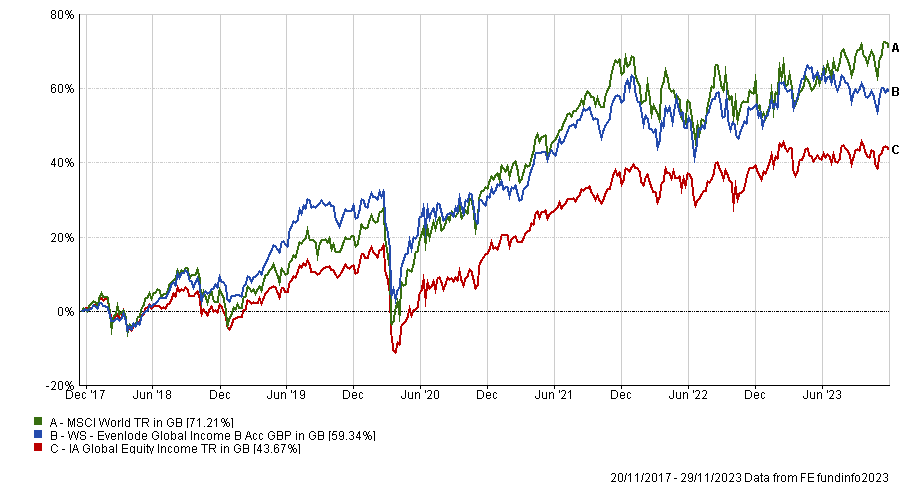Many wealth managers have been moving capital from the UK to global and US-based investments in recent years, but Ben Peters, FE fundinfo Alpha Manager of the £1.7bn Evenlode Global Income fund, has been doing the opposite, with his allocation to the US decreasing from 50% to 30% since the fund’s inception six years ago, with the UK up to 23%.
The fund has outperformed its average peer since 2017, as shown in the chart below, while offering a 2.2% yield with a focus on income compounding.
Below, the manager explains how that has come about, why he has been selling Microsoft and which UK-listed companies he finds attractive.
Performance of fund vs sector and index since inception
Source: FE Analytics
What are your investment philosophy and process?
We pick growing businesses in attractive sectors where they generate the cash that they need to invest in themselves and develop their customer offering through time. If they do that, they will generate cash and deliver a growing income stream to investors. We enter positions when they are attractively valued in the market.
Why should investors pick your fund?
It’s a core holding for people who want risks to be taken into account, as we manage business risk as well as valuation risk on their behalf. They should pick the fund if they want to grow their savings steadily through time and get equity-like returns but with a risk-managed process.
What is your approach to risk?
We are always looking to manage a broad range of risks at the company level and at the portfolio level. We pay a lot of attention to the strength of the portfolio's balance sheets, how leveraged our companies are and how economically sensitive the portfolio, as well as each company within it, is.
We also look at position size and set limits for positions. For example, we think UK stocks are really cheap and exciting but won't stick 50% of the fund in UK stocks.
Have you been allocating more to the UK?
Yes. Over a long period of time we've been decreasing our US exposure and investing in this side of the pond in Europe and the UK. More recently, prices have become very attractive in the UK market, so we've increased the weighting there and it’s about 23% the portfolio now.
What UK companies do you find most attractive?
We own very multinational businesses. Diageo is a relatively recent addition to the portfolio. We started to buy it in the summer, as the share price had come down about 20%. Globally, we see strong demand drivers for spirits in the long term, so despite some potential short-term headwinds, we are still adding to it.
Then we have Experian, which has a huge US business, and RELX, which is a very multinational and multi-product business.
These companies all happen to be UK-listed, they are all excellent businesses and for various reasons are trading at very attractive valuations at the current time.
How much has the US weighting decreased?
It went from nearly 50% when we launched six years ago to just over 30% now. The UK weighting reached 23% and it was briefly at nearly 24%, and the rest is made up of predominantly Europe.
But if you look at the underlying revenues of the companies in the portfolio, about 45% of the come from North America and that has barely budged, which shows the multinational nature of these companies.
What were your best calls of the past 12 months?
Microsoft was up 40% in total return terms as of the end of last month and contributed 2.1 percentage points to the fund’s performance.
There’s a lot of enthusiasm around all things artificial intelligence (AI) and Microsoft has a collaboration with Open AI [the company behind Chat GPT], but fundamentally it had already been incorporating those tools into its already existing, very significant cloud business, which is really where the company's strength is.
We've actually been reducing Microsoft a bit as it has been performing very well. The second-biggest contributor was Adidas, which was up 61% and contributed 1.2 percentage points.
If anything could have gone wrong for Adidas last year, it did. We invested when the share price had come down a lot, but then it went down an awful lot more. Now, it has turned around and we disposed of the holding a couple of months ago, primarily on valuation grounds but also because its difficulties will probably cause its balance sheet to weaken. With other consumer franchises looking better value, we moved on, but we are keeping our eye on it still.
And what about the worst calls?
The most negative performance was Roche, the Swiss pharma giant, which was down 24% and detracted 1.1 percentage points.
Like all pharmaceutical companies, it needs to replenish its pipeline as its drugs go off patent and there are some market concerns around that in the long term but we think it has probably as good a chance as any at developing new therapies. The market doesn’t see this as an interesting area, but we do see some exciting opportunities and good valuations here.
The second-worst was Medtronic, again in healthcare. It was down 21% and detracted 0.9 percentage points from performance.
What do you do outside of fund management?
I enjoy cycling, running and being in the mountains when I can with my family and friends. Being out in nature is a fantastic way to unwind and get perspective.





